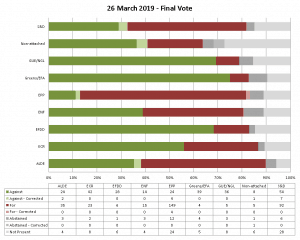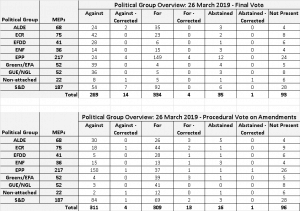Recent events
JURI Committee adoption of Trilogue agreement: On 26 February, the European Parliament’s lead Legal Affairs (JURI) Committee ‘rubber-stamped’ the provisional copyright trilogue agreement – see below. See how the JURI MEPs voted here.
Trilogue agreement: On 20 February 2019, the EU Member State Deputy Ambassadors approved the provisional copyright trilogue agreement during the meeting of the Committee of Permanent Representatives (COREPER 1). At this COREPER 1 meeting, the Governments of the Netherlands, Luxembourg, Poland, Italy and Finland opposed the agreement – see their joint statement. These countries consider “that the Directive in its current form is a step back for the Digital Single Market rather than a step forward”, and add that “the Directive lacks legal clarity, will lead to legal uncertainty for many stakeholders concerned and may encroach upon EU citizens’ rights”. Belgium and Slovenia abstained from the COREPER 1 vote.
Background on the provisional copyright trilogue agreement:
On 13 February, the European Parliament and Council, represented by the Romanian Council Presidency, reached a provisional trilogue agreement on the copyright reform.
The provisional copyright trilogue agreement that got brokered between the EU institutions, which is basically the Franco-German deal on Article 17 [ex Art. 13] that was reached in Council – read more below, implies that:
- Platforms will have to attempt to license all the content that can be uploaded on their platform, which is unfeasible; and,
- Failing to licence everything, they will need to do whatever they can to prevent unauthorised content from ever appearing on their platform, which will require them to implement upload filters to censor your content.
- These filters will catch everything that even remotely looks suspicious, because failing to comply with the above makes platform directly liable for any possible copyright infringement on their platforms. This means that perfectly legal content will also be caught in the web of the filternet.
- There are so-called ‘user safeguards’ and something that the legislators dare to call a ‘user-generated content’ (UGC) provision, but both are toothless and will leave users in the cold. The upfront removal of content will leave users powerless, and complaints will be just a waste of time – especially for time-sensitive campaigning content for human and digital rights organisations. The UGC provision shows that legislators have no understanding of what they require platforms to do, as filtering mechanisms are not able to identify legal content based on conditions which normally require lawyers and judges to interpret them.
See MEP Julia Reda’s analysis and the one from CREATe for more details.
Background on the Franco-German disagreement and compromise:
On Friday 18 January 2019, the EU Member States Deputy Ambassadors gathered in a meeting of the Council’s Committee of Permanent Representatives (COREPER 1). The Romanian Council Presidency (1 Jan – 30 Jun, 2019) had requested a revised negotiation mandate on, amongst others, the Article 17 [ex Art. 13] #CensorshipMachine. At this meeting, a number of Member States (Belgium, Croatia, Germany, Finland, Italy, Luxembourg, the Netherlands, Poland, Sweden, and Slovenia) blocked the Romanian Presidency. Portugal indicated that it needs more time to take a position.
This led the Romanian Council Presidency to postponing their negotiations with the European Parliament, i.e. trilogue negotiations, which were originally scheduled for 21 January. This ‘blocking minority’ was only achieved thanks to Germany opposing the proposals on the table. More specifically, there was a disagreement between the French and German delegation about the scope of Article 17 [ex Art. 13]: the German Government wants to exclude businesses with annual revenues of up to 20 million euros per year, whilst the French Government considers that no one should fall outside the scope of the #CensorshipMachine.
The Franco-German disagreement on the fate of small- and medium enterprises (SMEs) got settled in early February, with France succeeding in maintaining all SMEs within the scope of the Article 17 [ex Art. 13] #CensorshipMachine, whilst giving the German some useless SME carve-out that will never be meaningful in practice for any ambitious EU startups, as it is still requires all SMEs to negotiate licensing agreements and only exempts very small businesses (less than 10 million euros turnover) that are less than three years old from the filtering obligations.
The result of this Franco-German “horse trading” was poured into a new revised negotiation mandate by the Romanian Council Presidency, leaked by POLITICO, and which was adopted on February 8, 2019.


